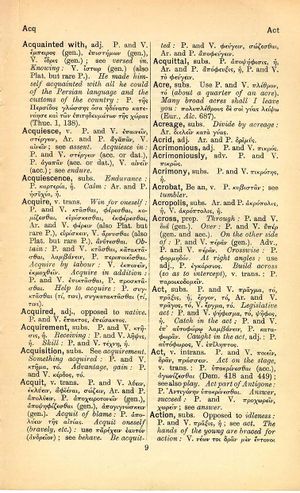action: Difference between revisions
From LSJ
Περὶ τοῦ ἐπέκεινα τοῦ νοῦ κατὰ μὲν νόησιν πολλὰ λέγεται, θεωρεῖται δὲ ἀνοησίᾳ κρείττονι νοήσεως → On the subject of that which is beyond intellect, many statements are made on the basis of intellection, but it may be immediately cognised only by means of a non-intellection superior to intellection
mNo edit summary |
mNo edit summary |
||
| Line 10: | Line 10: | ||
[[bring action against]]: P. εἰς ἀγῶνα καθιστάναι (acc.). | [[bring action against]]: P. εἰς ἀγῶνα καθιστάναι (acc.). | ||
[[virtue]], [[power]] ([[ | [[virtue]], [[power]] (of [[drug]]s, etc.): V. [[δύνασις]], ἡ, [[ἰσχύς]], ἡ. | ||
[[battle]]: P. and V. [[ἔργον]], τό. | [[battle]]: P. and V. [[ἔργον]], τό. | ||
Revision as of 10:34, 24 August 2019
English > Greek (Woodhouse)
subs.
opposed to idleness: P. and V. πρᾶξις, ἡ; see act.
the hands of the young are braced for action: V. νέων τοι δρᾶν μὲν ἔντονοι χέρες (Eur., Frag.).
at law: P. and V. δίκη, ἡ, ἀγών, ὁ.
bring action against: P. εἰς ἀγῶνα καθιστάναι (acc.).
virtue, power (of drugs, etc.): V. δύνασις, ἡ, ἰσχύς, ἡ.
put ships out of action: P. ναῦς ἄπλους ποιεῖν (Thuc. 7, 34).
some seven (ships) were put out of action: P. ἑπτά τινες ἄπλοι ἐγένοντο (Thuc. 7, 34).

